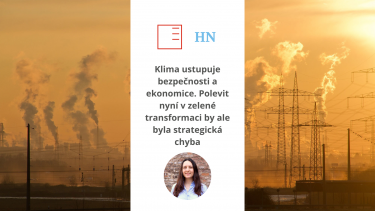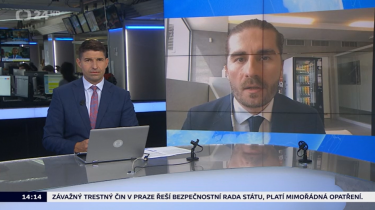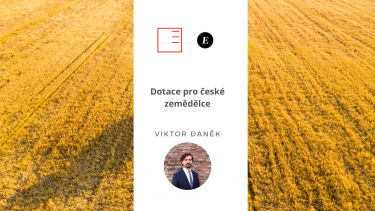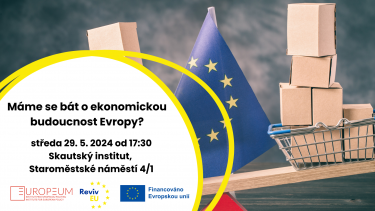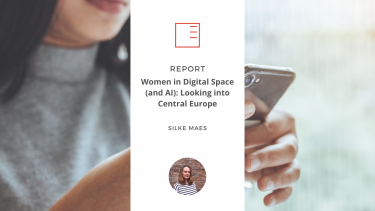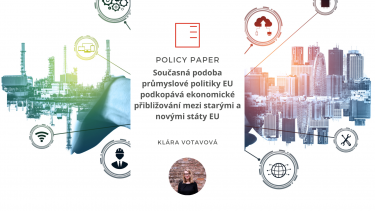Hospodářské noviny | Climate is giving way to security and economy. However, easing off on green transformation now would be a strategic mistake
This year's elections to the European Parliament have sparked debates about continuing the European plan to reduce greenhouse gas emissions to net zero by 2050, despite recent events suggesting the need to reassess this plan. The election results did not signify as much of a setback for European green ambitions as anticipated. The priority of climate and environment is no longer as high among most Europeans as it was five years ago, reflecting current political and international challenges such as security, economic prosperity, and the competitiveness of European industry. Kateřina Davidova, a researcher at EUROPEUM Institute, wrote an opinion piece on this topic for Hospodářské noviny.
Show more
Policy Brief | Were Czech industrial policy interests reflected in EU 2024-2029 strategic agenda discussions?
In light of the recent return of industrial policy to the global and EU stage, this policy brief outlines how Czech interests in this policy were reflected in the debates leading up to the adoption of 2024-2029 EU strategic agenda. First, it strives to define Czech industrial policy interests, outlining two alternative approaches to how they can be perceived. The liberal approach follows the long established consensus, according to which Czechia – as a very open, export oriented economy – should promote above all a seamless Single Market and free trade. Writes EUROPEUM Institute researcher Klára Votavová in her Policy Brief.
Show moreČT24 | Political shift after the European Parliament elections and its impact on the future of the EU
After the European Parliament elections, the strongest faction remains the European People's Party, a grouping that includes TOP09, KDU-ČSL and the Mayors and Independents. The Socialists and Democrats are second and Renew Europe, which includes the winning ANO party, is third. How significantly did the elections affect the European Parliament? Viktor Daněk, deputy director of EUROPEUM Institute, commented for ČT24.
Show moreRTVS | Elections show Europeans' new priorities
After the European Parliament elections, the two largest factions retained their positions. However, far right parties has made gains at the expense of the Liberals and Greens. It was significant in France, Germany, Austria and other Member States. Why more and more young people vote for them? Will the right-wing groups in the EP join forces? And how can they influence migration policy, support for Ukraine or the Green Deal? For RTVS programme Z prvej ruky comments Žiga Faktor, deputy director and head of the EUROPEUM Institute's Brussels office.
Show more
Ekonomický deník | Subsidies for Czech farmers
Farmers in the Czech Republic receive the fifth largest package of national subsidies in the European Union, behind Poland, Germany and Austria. Moreover, the whole system is set up in such a way that small farmers often do not receive subsidies at all. According to Viktor Daňek, deputy director of EUROPEUM Institute, the system cannot function fairly without a cap or a significant degression in payments.
Show moreRevivEU | Should we fear for the economic future of Europe?
We invite you to a public podcast recording focusing on the discussion of the impacts of the COVID-19 pandemic on European industrial policy and its potential consequences for the Czech economy and society. We will discuss the new technological dynamics resulting from the pandemic and explore ways in which the European Union can respond to technological competition with the USA and China.
Show moreReport | Women in Digital Space (and AI): Looking into Central Europe: cases from Austria, Czechia, Poland and Slovakia
Our researcher Silke Maes in her latest report addresses issues of cyberviolence on women and examines whether women in the CEE benefit from digitalisation (and AI). The report looks into how women use and contribute to the digital space, examines opportunities and challenges and proposes recommendations for a more inclusive digital space.
Show morePolicy paper | Current EU industrial policy undermines economic convergence between old and new EU countries
The post-communist states of Central and Eastern Europe, including the Czech Republic, joined the European Union at the height of globalisation and the dominance of the so-called Washington Consensus policies. However, the global economic crisis of 2008 showed shortly afterwards that these policies had their limits. Read more in Klára Votavová's Policy Pepeu.
Show morePolicy Paper | HOW TO PLAY THE DIGITAL POWER GAME WITH LIMITED MEANS Policy Principles for the Next European Commission
In the global competition for technological dominance, this policy brief sets out six principles for the next Commission on how to play the digital power game with limited resources. Despite the size of its market, the EU lacks common fiscal capacity, capital markets and labour market dynamics. Writes Silke Maes, Research Fellow at EUROPEUM Institute.
Show moreREPORT | EU-Pacific Talks | Global Race in Emerging Technologies: Lessons for EU-Pacific Cooperation
In the next debate of the EU-Pacific Talks series, hosted by EUROPEUM Institute for European Policy, the guests explored the relationship between cooperation and competition in overcoming technological frontiers in the context of pressing climate and industrial demands. Guests explored insights on fostering technological innovation, tackling climate change and promoting sustainable development. Read what our guests discussed in the report written by Simona Růžičková.
Show moreStaroměstské náměstí 4/1
Prague 1 - Staré Město
110 00
tel.: +420 212 246 552
email: europeum@europeum.org
https://www.europeum.org
